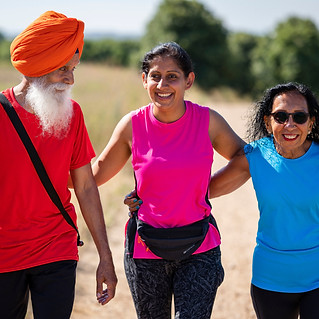
Our guide to loneliness
Grow your understanding with our comprehensive guide
What is loneliness?
We all feel lonely at times – it’s a natural human emotion. We're biologically wired for social contact, and loneliness is our signal that we need more. The definition: Loneliness is a perceived mismatch between the quality or quantity of social connections that a person has and what they would like to have [1]. Everyone's experiences of loneliness are different. It's subjective and personal to each of us.
Is loneliness the same as being alone?
You don’t have to be on your own to feel lonely - you might feel lonely in a relationship or while spending time with friends or family, on social media, in a city or at university. You can feel lonely if you feel like you are not being acknowledged or understood by those around you.
You can feel lonely when the relationships in your life are lacking in emotional depth, if you’ve grown apart from someone or if communication has broken down. You might feel lonely when you're by yourself. Other people might choose to be alone and live happily without much social contact. Loneliness can also be characterised by its intensity or how strongly it is felt, which can change from moment to moment and over different durations of time.
Are there different types of loneliness?
There are different types, including:
-
Emotional loneliness → When someone you were very close with is no longer there. This could be a partner, family member, close friend or pet.
-
Social loneliness → When you feel like you’re lacking a wider social network of friends, neighbours or colleagues.
-
Transient loneliness → A feeling that comes and goes.
-
Situational loneliness → Loneliness which you only feel at certain times like Sundays, bank holidays or Christmas.
-
Chronic loneliness → When you feel lonely all or most of the time.
Who experiences loneliness?
Most of us will experience loneliness at some point in our lives, regardless of age, circumstance and background. We all experience loneliness differently. It’s a common misconception that loneliness is limited to older people. In fact, 16-24-year-olds are the loneliest age group in the UK. [3] In 2023, a survey from Nextdoor in partnership with Marmalade Trust revealed that 85% of UK adults had experienced loneliness in the last 12 months. Almost half (44%) felt chronically lonely. [4]
Research suggests that some people are more vulnerable to loneliness than others. Examples of this include people who:
-
Have no friends or family, are a single parent or care for someone else
-
Belong to a minority group or live in an area where there aren't many people with a similar background
-
Are excluded from social activities because of mobility problems
-
Don't have much money for certain social activities
-
Experience discrimination and stigma because of your gender, race or your gender or sexual identity
-
Have experienced any kind of abuse, including neglect, which may make it find it harder to form close relationships with other people.
What causes loneliness?
Loneliness has many different causes, which vary from person to person. There are key life points which will increase the likelihood of feeling lonely.
Some examples are:
-
Moving away from home
-
Starting university or a new job
-
Becoming a new parent
-
Experiencing mental health problems
-
A relationship break-up
-
Suffering a bereavement
-
Retirement
Are loneliness and social isolation the same thing?
Social isolation and loneliness are both terms which relate to a degree of social disconnection. Social isolation can lead to loneliness, and feeling lonely can lead to social isolation. Many people are both lonely and isolated. People can experience different levels of social isolation and loneliness over their lifetime, moving in and out of these states as their personal circumstances change.
Research shows that we can start to fall into a cycle of loneliness: the longer we feel lonely the more we start to isolate ourselves. We can start to feel like there is something wrong with us, or that the world is an unfriendly and scary place when that normally isn’t the case at all. First and foremost, loneliness is a normal human emotion. Left unchecked, chronic or long-term loneliness can lead to mental health conditions like anxiety or depression.
Has loneliness always been an issue?
Human beings evolved to feel safest in groups, and as a result, we experience stress when we're disconnected or isolated. Imagine if you lived in a tribe, and while you were out hunting, you found yourself alone. You’d be under serious threat without the protection of your group - your levels of the stress hormone cortisol would rocket up and would stay raised until you’re back with your tribe.
Researchers believe that this stress and hypervigilance in response to isolation became embedded in our nervous system to produce the anxiety we associate with loneliness.
Fast forward to modern times, our biological need for connection remains, but our society has never been more disconnected. More of us live alone than ever before, our sense of belonging to neighbourhoods has fallen and 36% of people in the UK feel lonelier now than before the pandemic. [5-9]
Is loneliness a mental health problem?
Loneliness isn't a mental health problem. If left unchecked, loneliness can start to affect our mental and physical health, but it’s important to know that, first and foremost, it’s a normal and natural feeling.
Having a mental health problem can increase feelings of loneliness. For example, if you’re struggling with your mental health, you may avoid social events and activities or find it hard to try new things and worry about engaging with others.
What are the long-term effects of loneliness?
There has been lots of research on the effects of loneliness on our mental and physical health – it’s seen as one of the biggest health concerns we face.
Loneliness has been linked to early death and an increased risk of heart disease, stroke, depression, cognitive decline and poor sleep. It’s as harmful to our health as smoking 15 cigarettes a day. People who feel lonely are more than twice as likely to develop Alzheimer’s (and other forms of dementia) than those who do not feel lonely [9-12]. If you’ve been feeling lonely for a long time, make an appointment to see your GP to make sure that you are getting the right support.
Should we change the language around loneliness?
Telling someone that you’re lonely is an important step but it’s also important to be mindful of how we talk about it. We still use words like ‘admitting’ to and ‘suffering’ from, which can unintentionally add to the belief that something is wrong with us.
There is absolutely no shame in feeling lonely and changing the language around loneliness is a positive and liberating step forward. The more we talk about it, the more we normalise it and we can move towards a society where it can be spoken about openly.
Are you feeling lonely?
Loneliness can often feel overwhelming and something out of our control, so it can be useful to have a starting point. To help you and others to feel less lonely we have framed it into three parts:
-
Acknowledge loneliness in yourself or others
-
Identify what you or they need
-
Take the appropriate action
References
-
Perlman, Daniel, and L. Anne Peplau. “Toward a social psychology of loneliness.” Personal relationships 3 (1981): 31-56.
-
Campaign to End Loneliness. “About Loneliness”. (2021)
-
BBC Radio 4, All In The Mind. “The Loneliness Experiment”. (2018)
-
Nextdoor, Marmalade Trust. "The silent epidemic". (2023)
-
Johann Hari. “Lost Connections: Why You’re Depressed and How to Find Hope.” (2019)
-
Vivek Murthy. "Together: The Healing Power of Human Connection in a Sometimes Lonely World" (2020)
-
John T. Cacioppo, William Patrick. "Loneliness: Human Nature and the Need for Social Connection. (2009)
-
Cares Family. "Cost of Loneliness". (2022)
-
Eden Project. "Month of Community Report". (2022)
-
Holt-Lunstad et al. “Loneliness and Social Isolation as Risk Factors for Mortality: A MetaAnalytic Review”. (2015)
-
Valtorta et al. “Loneliness and social isolation as risk factors for coronary heart disease and stroke: systematic review and meta-analysis of longitudinal observational studies”. (2017)
-
Wilson et al.. “Loneliness and Risk of Alzheimer Disease”. (2007)
.png)



.jpg)